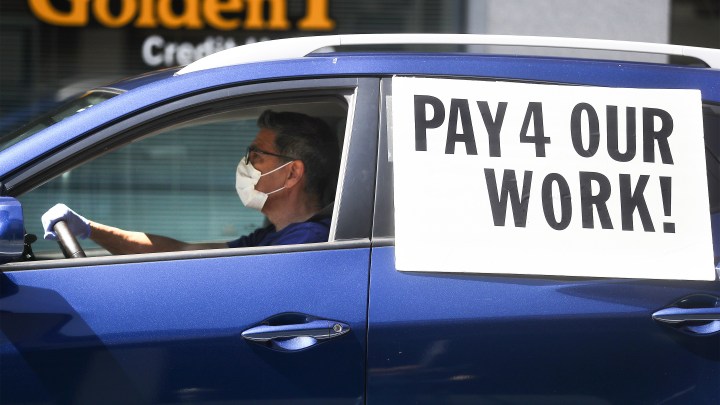
Must workers choose between benefits and flexibility?
Must workers choose between benefits and flexibility?

A California court Monday ruled that Uber and Lyft must reclassify drivers as employees rather than independent contractors. Employee status comes with many important benefits, like paid sick leave, unemployment insurance and subsidized health insurance.
But Uber CEO Dara Khosrowshahi argued in a New York Times op-ed that it comes at the expense of flexibility, the lifeblood of the gig economy. He called for a new “third way” to classify and provide benefits to workers who fall somewhere between employee and independent contractor.
Under existing labor law, workers in America have to be classified as either an employee or an independent contractor. Paul Oyer, an economist at Stanford University, said that binary system goes back to the early 20th century when work looked pretty different.
“So the law isn’t perfect,” he said. “There’s a spectrum of possible work relationships. And we want to both protect workers along that spectrum, but also allow some amount of flexibility.”
While the pandemic has highlighted the need for better protections for gig workers, most still prefer to be independent, according to one survey, so they can set their own hours.
Gig platforms have argued that won’t be possible if workers are employees.
“That is just untrue,” said Benjamin Sachs, a professor of labor law at Harvard University. “You can be an employee and have an entirely flexible work arrangement.”
Many workers already do, especially now. But Seth Oranburg, a law professor at Duquesne University, said allowing employees to set their own hours often doesn’t make business sense.
“An employee that brings in $500 a month and cost $1,500 a month just for health care doesn’t add up economically,” he said.
Worker classifications and their attendant benefits could become increasingly important as the pandemic accelerates changes to employment beyond the gig economy, said New York University business professor Arun Sundararajan.
“The crisis that we’re going through now has wiped the slate clean,” he said. “Many companies have let go tons of full-time employees and so they have a chance to reconstruct their workforce and work arrangements.”
With so many workers out of the office and working independently, he said white collar work could start to look more like the gig economy.
There’s a lot happening in the world. Through it all, Marketplace is here for you.
You rely on Marketplace to break down the world’s events and tell you how it affects you in a fact-based, approachable way. We rely on your financial support to keep making that possible.
Your donation today powers the independent journalism that you rely on. For just $5/month, you can help sustain Marketplace so we can keep reporting on the things that matter to you.


















